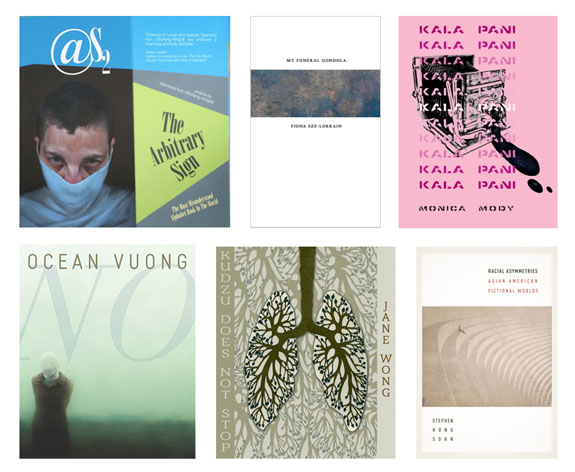 It’s the first month of the new year, and so much news about exciting new books has come across our desk of late that we thought we’d put together a couple of roundup posts in order to put some of the titles that we’re most looking forward to reading in the coming year on your radar. In today’s post (part 1), I’ll be discussing six recently published titles (five full-length books and one chapbook) that have made top priority on my to-read list for 2014. Part 2 (which will follow next week) will focus on forthcoming books that are due out in 2014.
It’s the first month of the new year, and so much news about exciting new books has come across our desk of late that we thought we’d put together a couple of roundup posts in order to put some of the titles that we’re most looking forward to reading in the coming year on your radar. In today’s post (part 1), I’ll be discussing six recently published titles (five full-length books and one chapbook) that have made top priority on my to-read list for 2014. Part 2 (which will follow next week) will focus on forthcoming books that are due out in 2014.
Note: the books discussed below appear alphabetically by author; the order in which they’re listed does not reflect any sort of ranking or order of preference. (We’re equally excited about all of them!)
* * *
The Arbitrary Sign by Desmond Kon Zhicheng-Mingdé (Red Wheelbarrow, 2013)
Desmond Kon is a two-time contributor to LR (his work appears in both issue 1 and issue 5), and both times that we’ve published him, Mia and I had a really hard time choosing just two of the poems he’d sent in each batch. Desmond’s work interests itself in philosophy, visual art, pop culture, and the sounds and textures of language: he is interested in dadaism and in other forms of the avant-garde, and has a unique gift for finding the music in both “high” language (such as academic jargon) and “low” forms of speech—slang, text speak, gossip column patter. The genius of his poems lies in their polyglot nature—the way that he mixes contrasting modes of speech and weaves easily in and out of a variety of languages. His pieces work because there is a delightfully haphazard quality to their approach, a lightness that plays against both the weight of the poems’ scale and subject matter and the deliberate care with which the poet has gathered, built up, and sculpted their many intricate layers of texture and pattern. Desmond, a highly prolific writer, has published multiple chapbooks (both in the US and in his home city-state of Singapore) and has a long list of journal and anthology credits to his name—and for good reason. I’ve no doubt The Arbitrary Sign—a philosophical twist on the form of the classic alphabet book—will be as delightful as the rest of his body of work.
For a sneak peek at The Arbitrary Sign, head on over to Kitaab to read six of the poems that appear in the collection.
* * *
Kala Pani by Monica Mody (1913 Press, 2013)
This is a book I’ve been looking forward to for a long while now. Monica wrote for us as a staff reviewer from 2010 through 2011, and we later had the privilege of getting to publish a poem of hers in issue 4. Her work is deeply invested in myth and parable, and the textures of her writing are rich and sinuously complex—by turns liquid and transparent, and by others, knotty and grotesque. She has an exceptionally keen ear for music and magic, both of which suffuse her work. I had the pleasure of getting to read and workshop portions of Kala Pani back in 2009. It is a hybrid piece (partway between poetry and prose) that takes up the narrative of a group of world travellers who converge around an ancient tree. In it, the poet deftly plies together the fibers of what at first appears to be an allegory-like story, only to tease and unspun these threads mid-strand and remake them again (differently) in the next breath. What I admired most about the manuscript when I saw it in workshop was the way in which the tapestry of the piece’s language shatters and shifts at a moment’s notice—like quicksilver. Monica is a brilliant critical thinker, in addition to being a talented poet, and it shows in the deeply intelligent nature of her writing: though she is keen to investigate notions of trauma, geography, time, race, gender, spirituality, etc., her writing neither preaches endlessly nor holds to an overly simplistic view of the political: rather, she holds questions up to a mirror, testing them on a knife’s edge. She recognizes that the notions of place and identity are inherently fraught with instability, and she both celebrates and problematizes this complexity: the characters of which she writes transform and bleed into one another, metamorphose and cycle back to avatars of themselves, over and over again, in many different ways. It’s been a couple of years since 1913 first announced that it had acquired Kala Pani, and now that the book is finally out, I can’t wait to read the finished product.
Excerpts of Kala Pani can be found at The Volta, the Boston Review, and Lies/Isle.
Continue reading “Editors’ Corner: Books We’re Looking Forward to in 2014 (Part 1)”